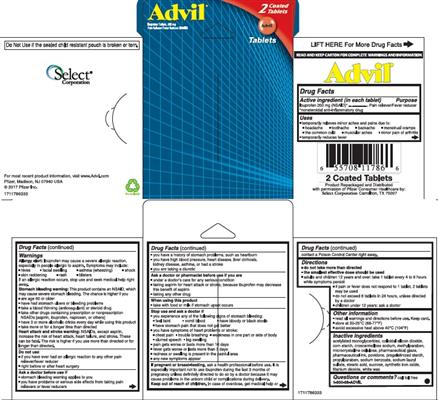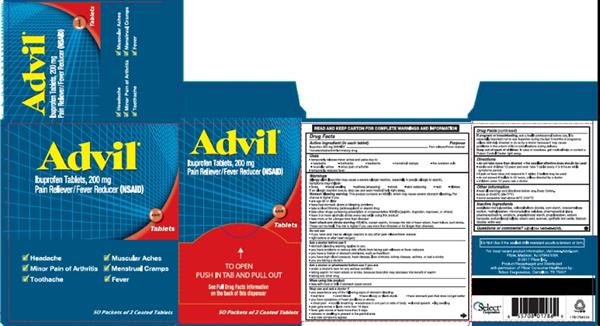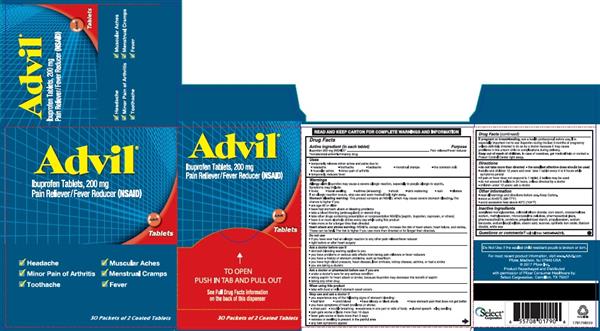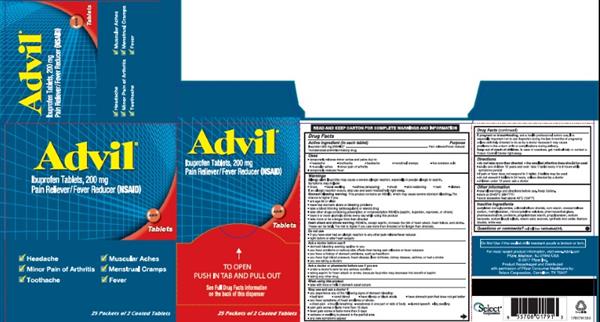What is Advil?
Advil (ibuprofen) is a nonsteroidal anti-inflammatory drug (NSAID). Ibuprofen works by reducing hormones that cause inflammation and pain in the body.
Ibuprofen is often known by its given name, but you may also know it as Advil or Motrin. It is classified as a nonsteroidal anti-inflammatory drug (NSAID). Other members of this drug class include aspirin and naproxen (Aleve). Advil only contains Ibuprofen, a nonsteroidal anti-inflammatory drug that helps to treat pain at the source.
Advil is used to reduce fever and treat pain or inflammation caused by many conditions such as headache, toothache, back pain, arthritis, menstrual cramps, or minor injury.
Advil is used in adults and children who are at least 6 months old.

Important information
Advil can increase your risk of fatal heart attack or stroke, especially if you use it long term or take high doses, or if you have heart disease. Do not use this medicine just before or after heart bypass surgery (coronary artery bypass graft, or CABG).
Advil may also cause stomach or intestinal bleeding, which can be fatal. These conditions can occur without warning while you are using ibuprofen, especially in older adults.
Do not take more than your recommended dose. An Advil overdose can damage your stomach or intestines. Use only the smallest amount of medication needed to get relief from your pain, swelling, or fever.
Before taking Advil
Advil can increase your risk of fatal heart attack or stroke, especially if you use it long term or take high doses, or if you have heart disease. Even people without heart disease or risk factors could have a stroke or heart attack while taking this medicine.
Do not use this medicine just before or after heart bypass surgery (coronary artery bypass graft, or CABG).
Advil may also cause stomach or intestinal bleeding, which can be fatal. These conditions can occur without warning while you are using ibuprofen, especially in older adults.
You should not use Advil if you are allergic to ibuprofen, or if you have ever had an asthma attack or severe allergic reaction after taking aspirin or an NSAID.
Ask a doctor or pharmacist if it is safe for you to take this medicine if you have:
- heart disease, high blood pressure, high cholesterol, diabetes, or if you smoke;
- a history of heart attack, stroke, or blood clot;
- a history of stomach ulcers or bleeding;
- asthma;
- liver or kidney disease;
- fluid retention; or
- a connective tissue disease such as Marfan syndrome, Sjogren’s syndrome, or lupus.
Taking Advil during the last 3 months of pregnancy may harm the unborn baby. Do not use this medicine without a doctor’s advice if you are pregnant.
It is not known whether ibuprofen passes into breast milk or if it could harm a nursing baby. Do not use this medicine without a doctor’s advice if you are breast-feeding a baby.
Do not give ibuprofen to a child younger than 6 months old without the advice of a doctor.
How should I take Advil?
Use Advil exactly as directed on the label, or as prescribed by your doctor. Do not use in larger amounts or for longer than recommended. Use the lowest dose that is effective in treating your condition.
Do not take more than your recommended dose. An Advil overdose can damage your stomach or intestines. The maximum amount of ibuprofen for adults is 800 milligrams per dose or 3200 mg per day (4 maximum doses). Use only the smallest amount of ibuprofen needed to get relief from your pain, swelling, or fever.
A child’s dose of ibuprofen is based on the age and weight of the child. Carefully follow the dosing instructions provided with children’s Advil for the age and weight of your child. Ask a doctor or pharmacist if you have questions.
Take Advil with food or milk to lessen stomach upset.
Shake the oral suspension (liquid) well just before you measure a dose. Measure liquid medicine with the dosing syringe provided, or with a special dose-measuring spoon or medicine cup. If you do not have a dose-measuring device, ask your pharmacist for one.
The Advil chewable tablet must be chewed before you swallow it.
If you use this medicine long-term, you may need frequent medical tests.
Store at room temperature away from moisture and heat. Do not allow the liquid medicine to freeze.
Read all patient information, medication guides, and instruction sheets provided to you. Ask your doctor or pharmacist if you have any questions.
What happens if I miss a dose?
Since Advil is used when needed, you may not be on a dosing schedule. If you are on a schedule, use the missed dose as soon as you remember. Skip the missed dose if it is almost time for your next scheduled dose. Do not use extra medicine to make up the missed dose.
What happens if I overdose?
Seek emergency medical attention or call the Poison Help line at 1-800-222-1222. Overdose symptoms may include nausea, vomiting, stomach pain, drowsiness, black or bloody stools, coughing up blood, shallow breathing, fainting, or coma.
What should I avoid while taking Advil?
Avoid drinking alcohol. It may increase your risk of stomach bleeding.
Avoid taking aspirin while you are taking Advil.
Avoid taking Advil if you are taking aspirin to prevent stroke or heart attack. Ibuprofen can make aspirin less effective in protecting your heart and blood vessels. If you must use both medications, take the Advil at least 8 hours before or 30 minutes after you take the aspirin (non-enteric coated form).
Ask a doctor or pharmacist before using any cold, allergy, or pain medicine. Many medicines available over the counter contain aspirin or other medicines similar to ibuprofen. Taking certain products together can cause you to get too much of this type of medication. Check the label to see if a medicine contains aspirin, ibuprofen, ketoprofen, or naproxen.
Advil side effects
Get emergency medical help if you have signs of an allergic reaction to Advil: sneezing, runny or stuffy nose; wheezing or trouble breathing; hives; swelling of your face, lips, tongue, or throat.
Get emergency medical help if you have signs of a heart attack or stroke: chest pain spreading to your jaw or shoulder, sudden numbness or weakness on one side of the body, slurred speech, feeling short of breath.
Stop using Advil and call your doctor at once if you have:
- changes in your vision;
- shortness of breath (even with mild exertion);
- swelling or rapid weight gain;
- the first sign of any skin rash, no matter how mild;
- signs of stomach bleeding – bloody or tarry stools, coughing up blood or vomit that looks like coffee grounds;
- liver problems – nausea, upper stomach pain, itching, tired feeling, flu-like symptoms, loss of appetite, dark urine, clay-colored stools, jaundice (yellowing of the skin or eyes);
- kidney problems – little or no urinating, painful or difficult urination, swelling in your feet or ankles, feeling tired or short of breath;
- low red blood cells (anemia) – pale skin, feeling light-headed or short of breath, rapid heart rate, trouble concentrating; or
- severe skin reaction – fever, sore throat, swelling in your face or tongue, burning in your eyes, skin pain followed by a red or purple skin rash that spreads (especially in the face or upper body) and causes blistering and peeling.
Common Advil side effects may include:
- upset stomach, mild heartburn, nausea, vomiting;
- bloating, gas, diarrhea, constipation;
- dizziness, headache, nervousness;
- mild itching or rash; or
- ringing in your ears.
This is not a complete list of side effects and others may occur. Call your doctor for medical advice about side effects. You may report side effects to FDA at 1-800-FDA-1088.
What other drugs will affect Advil?
Ask your doctor before using Advil if you take an antidepressant such as citalopram, escitalopram, fluoxetine (Prozac), fluvoxamine, paroxetine, sertraline (Zoloft), trazodone, or vilazodone. Taking any of these medicines with an NSAID may cause you to bruise or bleed easily.
Ask a doctor or pharmacist if it is safe for you to use Advil if you are also using any of the following drugs:
- lithium;
- methotrexate;
- a blood thinner (warfarin, Coumadin, Jantoven);
- heart or blood pressure medication, including a diuretic or “water pill”; or
- steroid medicine (such as prednisone).
This list is not complete. Other drugs may interact with ibuprofen, including prescription and over-the-counter medicines, vitamins, and herbal products.
Not all possible interactions are listed in this medication guide.
More Information about Advil
advilADVIL- ibuprofen tablet, coated
Wyeth Pharmaceuticals Company
———-
ADVIL Tablets (ibuprofen)
DRUG FACTS
ACTIVE INGREDIENT
Advil Tablets (in each tablet)
Ibuprofen 200 mg (NSAID)*
*nonsteroidal anti-inflammatory drug
Advil Caplets (in each caplet)
Ibuprofen 200 mg (NSAID)*
*nonsteroidal anti-inflammatory drug
Advil Gel Caplets (in each gel caplet)
Ibuprofen 200 mg (NSAID)*
*nonsteroidal anti-inflammatory drug
PURPOSE
Pain reliever/Fever reducer
USES
- temporarily relieves minor aches and pains due to:
- headache
- toothache
- backache
- menstrual cramps
- the common cold
- muscular aches
- minor pain of arthritis
- temporarily reduces fever
WARNINGS
Allergy alert:
Ibuprofen may cause a severe allergic reaction, especially in people allergic to aspirin. Symptoms may include:
- hives
- facial swelling
- asthma (wheezing)
- shock
- skin reddening
- rash
- blisters
If an allergic reaction occurs, stop use and seek medical help right away.
Stomach bleeding warning:
This product contains an NSAID, which may cause severe stomach bleeding. The chance is higher if you
- are age 60 or older
- have had stomach ulcers or bleeding problems
- take a blood thinning (anticoagulant) or steroid drug
- take other drugs containing prescription or non-prescription NSAIDs [aspirin, ibuprofen, naproxen, or others]
- have 3 or more alcoholic drinks every day while using this product
- take more or for a longer time than directed
Heart attack and stroke warning
NSAIDs, except aspirin, increase the risk of heart attack, heart failure, and stroke. These can be fatal. The risk is higher if you use more than directed or for longer than directed.
Do not use
- if you have ever had an allergic reaction to any other pain reliever/fever reducer
- right before or after heart surgery
Ask a doctor before use if
- stomach bleeding warning applies to you
- you have problems or serious side effects from taking pain relievers or fever reducers
- you have a history of stomach problems, such as heartburn
- you have high blood pressure, heart disease, liver cirrhosis, kidney disease, asthma, or had a stroke
- you are taking a diuretic
Ask a doctor or pharmacist before use if you are
- under a doctor’s care for any serious condition
- taking aspirin for heart attack or stroke, because ibuprofen may decrease this benefit of aspirin
- taking any other drug
When using this product
- take with food or milk if stomach upset occurs
Stop use and ask a doctor if
- you experience any of the following signs of stomach bleeding:
- feel faint
- vomit blood
- have bloody or black stools
- have stomach pain that does not get better
- you have symptoms of heart problems or stroke:
- chest pain
- trouble breathing
- weakness in one part or side of body
- slurred speech
- leg swelling
- pain gets worse or lasts more than 10 days
- fever gets worse or lasts more than 3 days
- redness or swelling is present in the painful area
- any new symptoms appear
If pregnant or breast-feeding,
ask a health professional before use. It is especially important not to use ibuprofen during the last 3 months of pregnancy unless definitely directed to do so by a doctor because it may cause problems in the unborn child or complications during delivery.
Keep out of reach of children.
In case of overdose, get medical help or contact a Poison Control Center right away.
Advil DIRECTIONS
Advil Tablets
- do not take more than directed
- the smallest effective dose should be used
- adults and children 12 years and over: take 1 tablet every 4 to 6 hours while symptoms persist
- if pain or fever does not respond to 1 tablet, 2 tablets may be used
- do not exceed 6 tablets in 24 hours, unless directed by a doctor
- children under 12 years: ask a doctor
Advil Caplets
- do not take more than directed
- the smallest effective dose should be used
- adults and children 12 years and over: take 1 caplet every 4 to 6 hours while symptoms persist
- if pain or fever does not respond to 1 caplet, 2 caplets may be used
- do not exceed 6 caplets in 24 hours, unless directed by a doctor
- children under 12 years: ask a doctor
Advil Gel Caplets
- do not take more than directed
- the smallest effective dose should be used
- adults and children 12 years and over: take 1 gel caplet every 4 to 6 hours while symptoms persist
- if pain or fever does not respond to 1 gel caplet, 2 gel caplets may be used
- do not exceed 6 gel caplets in 24 hours, unless directed by a doctor
- children under 12 years: ask a doctor
OTHER INFORMATION
- read all warnings and directions before use. Keep carton.
- store at 20-25°C (68-77°F)
- avoid excessive heat above 40°C (104°F)
INACTIVE INGREDIENTS
Advil Tablets
acetylated monoglycerides, colloidal silicon dioxide, corn starch, croscarmellose sodium, methylparaben, microcrystalline cellulose, pharmaceutical glaze, pharmaceutical ink, povidone, pregelatinized starch, propylparaben, sodium benzoate, sodium lauryl sulfate, stearic acid, sucrose, synthetic iron oxide, titanium dioxide, white wax
Advil Caplets
acetylated monoglycerides, colloidal silicon dioxide, corn starch, croscarmellose sodium, methylparaben, microcrystalline cellulose, pharmaceutical glaze, pharmaceutical ink, povidone, pregelatinized starch, propylparaben, sodium benzoate, sodium lauryl sulfate, stearic acid, sucrose, synthetic iron oxide, titanium dioxide, white wax
Advil Gel Caplets
colloidal silicon dioxide, corn starch, croscarmellose sodium, FD&C red no. 40, FD&C yellow no. 6, fractionated coconut oil, gelatin, glycerin, hypromellose, pharmaceutical ink, pregelatinized starch, propyl gallate, purified water, sodium lauryl sulfate, stearic acid, synthetic iron oxides, titanium dioxide, triacetin
Questions or comments?
call toll free 1-800-88-ADVIL
HOW SUPPLIED
Product: 52904-794
NDC: 52904-794-05 2 TABLET, COATED in a POUCH / 1 in a CARTON
NDC: 52904-794-01 2 TABLET, COATED in a POUCH / 1 in a BLISTER PACK
NDC: 52904-794-02 2 TABLET, COATED in a POUCH / 2 in a BLISTER PACK
NDC: 52904-794-06 2 TABLET, COATED in a POUCH / 2 in a CARTON
Product: 52904-786
NDC: 52904-786-50 2 TABLET, COATED in a POUCH / 50 in a CASE
Product: 52904-790
NDC: 52904-790-30 2 TABLET, COATED in a POUCH / 30 in a CASE
Product: 52904-791
NDC: 52904-791-25 2 TABLET, COATED in a POUCH / 25 in a CASE
IBUPROFEN

ADVIL (IBUPROFEN) TABLET, COATED

ADVIL (IBUPROFEN) TABLET, COATED

ADVIL (IBUPROFEN)

| ADVIL ibuprofen tablet, coated |
||||||||||||||||||||||||||||||||||||
|
||||||||||||||||||||||||||||||||||||
|
||||||||||||||||||||||||||||||||||||
|
||||||||||||||||||||||||||||||||||||
|
||||||||||||||||||||||||||||||||||||
|
||||||||||||||||||||||||||||||||||||
|
||||||||||||||||||||||||||||||||||||
| ADVIL ibuprofen tablet, coated |
||||||||||||||||||||||||||||||||||||
|
||||||||||||||||||||||||||||||||||||
|
||||||||||||||||||||||||||||||||||||
|
||||||||||||||||||||||||||||||||||||
|
||||||||||||||||||||||||||||||||||||
|
||||||||||||||||||||||||||||||||||||
|
||||||||||||||||||||||||||||||||||||
| ADVIL ibuprofen tablet, coated |
||||||||||||||||||||||||||||||||||||
|
||||||||||||||||||||||||||||||||||||
|
||||||||||||||||||||||||||||||||||||
|
||||||||||||||||||||||||||||||||||||
|
||||||||||||||||||||||||||||||||||||
|
||||||||||||||||||||||||||||||||||||
|
||||||||||||||||||||||||||||||||||||
| ADVIL ibuprofen tablet, coated |
||||||||||||||||||||||||||||||||||||||||||||||||||
|
||||||||||||||||||||||||||||||||||||||||||||||||||
|
||||||||||||||||||||||||||||||||||||||||||||||||||
|
||||||||||||||||||||||||||||||||||||||||||||||||||
|
||||||||||||||||||||||||||||||||||||||||||||||||||
|
||||||||||||||||||||||||||||||||||||||||||||||||||
|
||||||||||||||||||||||||||||||||||||||||||||||||||
| Labeler – Wyeth Pharmaceuticals Company (053805599) |
| Establishment | |||
| Name | Address | ID/FEI | Business Operations |
|---|---|---|---|
| Select Corporation | 829390975 | manufacture(52904-794, 52904-786, 52904-790, 52904-791) | |
IMPORTANT WARNING:
People who take nonsteroidal anti-inflammatory drugs (NSAIDs) (other than aspirin) such as ibuprofen may have a higher risk of having a heart attack or a stroke than people who do not take these medications. These events may happen without warning and may cause death. These problems may develop at any time during treatment, but the risk may be higher for people who take NSAIDs for a long time or at higher doses. Do not take an NSAID such as ibuprofen if you have recently had a heart attack, unless directed to do so by your doctor. Tell your doctor if you or anyone in your family has or has ever had heart disease, a heart attack, or a stroke; if you smoke; and if you have or have ever had high cholesterol, high blood pressure, or diabetes. Get emergency medical help right away if you experience any of the following symptoms: chest pain, shortness of breath, weakness in one part or side of the body, or slurred speech.
If you will be undergoing a coronary artery bypass graft (CABG; a type of heart surgery), you should not take ibuprofen right before or right after the surgery.
NSAIDs such as ibuprofen may cause ulcers, bleeding, or holes in the esophagus (tube between the mouth and stomach), stomach, or intestine. These problems may develop at any time during treatment, may happen without warning symptoms, and may cause death. The risk may be higher for people who take NSAIDs for a long time, are older in age, have poor health, who smoke, or who drink large amounts of alcohol while taking ibuprofen. Tell your doctor if you take any of the following medications: anticoagulants (‘blood thinners’); aspirin; other NSAIDs such as naproxen (Aleve, Naprosyn); oral steroids such as dexamethasone, methylprednisolone (Medrol), and prednisone (Rayos);selective serotonin reuptake inhibitors (SSRIs) such as citalopram (Celexa), fluoxetine (Prozac, Sarafem, Selfemra, in Symbyax), fluvoxamine (Luvox), paroxetine (Brisdelle, Paxil, Pexeva), and sertraline (Zoloft); or serotonin norepinephrine reuptake inhibitors (SNRIs) such as desvenlafaxine (Khedezla, Pristiq), duloxetine (Cymbalta), and venlafaxine (Effexor XR). Also tell your doctor if you have or have ever had ulcers, bleeding in your stomach or intestines, or other bleeding disorders. If you experience any of the following symptoms, stop taking ibuprofen and call your doctor: stomach pain, heartburn, vomit that is bloody or looks like coffee grounds, blood in the stool, or black and tarry stools.
Keep all appointments with your doctor and the laboratory. Your doctor will monitor your symptoms carefully and will probably order certain tests to check your body’s response to ibuprofen. Be sure to tell your doctor how you are feeling so that your doctor can prescribe the right amount of medication to treat your condition with the lowest risk of serious side effects.
Your doctor or pharmacist will give you the manufacturer’s patient information sheet (Medication Guide) when you begin treatment with prescription ibuprofen and each time you refill your prescription. Read the information carefully and ask your doctor or pharmacist if you have any questions. You can also visit the Food and Drug Administration (FDA) website (http://www.fda.gov/Drugs/DrugSafety/ucm085729.htm) or the manufacturer’s website to obtain the Medication Guide.